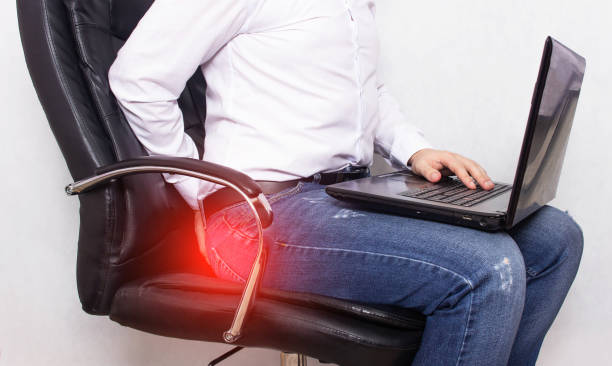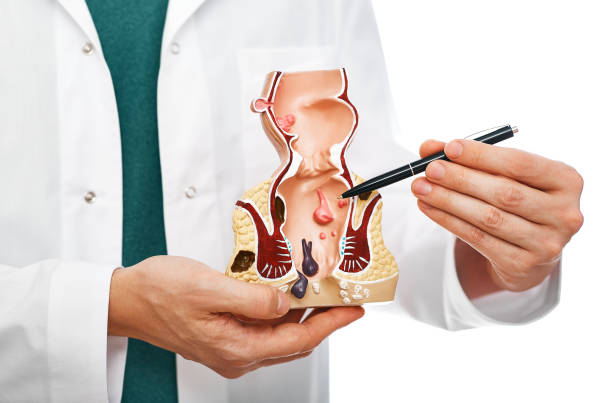Treatments & Medications For Hemorrhoids
Hemorrhoids affect both men and women, and approximately half of the population will have them by the age of 50. There are a variety of at-home treatments and drugs available for hemorrhoids sufferers to assist alleviate the discomfort and irritation they can cause.
Hemorrhoids, often known as piles, are bulging veins that develop inside and around the anus and rectum. Hemorrhoids are often not seen until they bleed, become unpleasant, or cause pain.
While hemorrhoids are a frequent issue, seeking expert medical care for the condition is far less prevalent, which is why we're here to help. Let's look at the reasons of hemorrhoids and what may be done to treat them for individuals who aren't sure how to treat them.
What's A Hemorrhoid?
Hemorrhoids are a kind of gastrointestinal ailment that primarily affects individuals aged 45 to 65. Younger individuals, on the other hand, can still get them, especially if they have diarrhea or constipation.
Increased pressure on the abdomen from extended straining, sitting, coughing, constipation, or pregnancy can cause hemorrhoids.
Internal hemorrhoids and external hemorrhoids are the two types of hemorrhoids.
- Internal hemorrhoids are less uncomfortable than external hemorrhoids, even when they bleed. Internal hemorrhoids, on the other hand, can spread beyond the anus, posing a number of complications. When a hemorrhoid protrudes, it might accumulate small quantities of mucus and small stool particles, which can create pruritus ani, or itchy skin. Wiping the area to try to reduce the itching might aggravate the situation.
- External hemorrhoids are the most painful because the skin overlaying the anus, which contains many pain-sensing nerves, becomes inflamed and erodes. A blood clot forming inside an external hemorrhoid can cause excruciating agony. A bulge around the anus may be felt or seen. The clot normally resolves, leaving behind extra skin that itch and irritates.
Hemorrhoids may be devastating when they induce pain. So, when they get to the point where they're bothering you, you should seek medical help.
Hemorrhoids Are Diagnosed In A Variety Of Ways
Hemorrhoids can appear for no obvious reason, although they are frequently linked to persistent constipation or diarrhea, intestinal straining, and extended sitting.
It's critical to speak with a healthcare physician and be upfront about your symptoms, as difficult as it may be to do so. Your primary care provider is a wonderful place to start if you fear you have hemorrhoids. Your doctor will be able to examine you and, if required, recommend you to a specialist. In most cases, a specialist such as a gastroenterologist or a proctologist will be advised only if problems are a worry.
External hemorrhoids are plainly visible, thus a physical examination of the anus typically confirms the diagnosis. A digital examination of the lower rectum will very certainly be included in this physical, which can validate muscle anatomy and commonly find polyps and/or cancers.
Another sort of physical examination is an anoscopy. The internal wall of the anal canal and the very lowest region of the rectum are examined using an endoscopic equipment with a light. An anoscope, also known as an anal speculum, is a tiny, hard tool that is inserted a few inches into the anus. An anoscopy, as frightening as it may seem, is considered painless, but you may feel some pressure.
A more thorough inspection of the large intestine may be recommended in some circumstances, in which case a colonoscopy and/or flexible sigmoidoscopy may be used.
After the first consultation, barium enemas, which use a contrast solution infused into the rectum for x-ray imaging, may be a possibility.
During your consultation, your healthcare professional may ask you the following questions:
- When did you first notice your symptoms?
- Have you ever been in a situation like this before?
- Is there anything that makes you feel uneasy?
- Do you take any prescription drugs?
You might also want to ask your doctor certain questions, like: Do I have hemorrhoids?
- What therapy choices do I have?
- Are there any tests you need to run?
- Will you be subjected to a physical examination?
- How long will it take for you to recover?
- What caused the hemorrhoids in the first place?
We appreciate that this is a sensitive subject for many individuals, but we advise you to seek out healthcare providers with whom you can communicate honestly. They're experts, and the more information you provide, the more they'll be able to assist you and choose the best treatment choice for you.
Treatment Options For Hemorrhoids
The good news is that if you've been diagnosed with hemorrhoids, you have a lot of treatment choices. These include over-the-counter (OTC) drugs, sitz baths, and dietary adjustments, but they can also entail prescription medication and, in certain cases, surgery.
Remember that hemorrhoids may be treated, and there are techniques to keep the painful disease from resurfacing. Avoid straining during bowel movements, eat a high-fiber diet rich in fruits, vegetables, and whole grains, and remain hydrated to avoid piles in the future. Exercise on a regular basis, going to the toilet as soon as you feel the urge, and avoiding sitting for long amounts of time will all help prevent another flare-up.
Medications available over-the-counter
The majority of minor cases of hemorrhoids may be treated with over-the-counter lotions, gels, ointments, and wipes. Most OTC treatments contain a vasoconstrictor, which helps reduce the size of the hemorrhoid and relieves pressure and discomfort by tightening blood vessels and shrinking skin tissue.
Skin protectants and, in some cases, topical pain relievers like lidocaine are included in these medications. Some over-the-counter hemorrhoid treatments contain hydrocortisone, a steroid that reduces inflammation and so relieves pressure and pain.
Medications on prescription
If your problem is more severe, your doctor may prescribe a stronger treatment, such as a topical hydrocortisone and pramoxine combination. These medications diminish the amount of the pile while also numbing the region to relieve pain.
Surgery
Your healthcare provider may refer you to a surgical specialist if you have large internal hemorrhoids or extremely uncomfortable external hemorrhoids. A traditional hemorrhoidectomy or newer techniques using staples or a Doppler sensor to identify and cut off the blood supply may be used. Hemorrhoids can be treated medically, but unless you adjust your diet and lifestyle, they may return.
Other non-surgical alternatives
Your healthcare practitioner may consider an office-based nonsurgical surgery if internal hemorrhoids continue to produce problems despite home therapy. The following are the most prevalent choices:
- Internal hemorrhoids are treated by rubber band ligation, which is the most common technique. A short elastic band is wrapped around the base of a hemorrhoid after being pushed into the anal canal. The band prevents the hemorrhoid from receiving blood, causing it to wither and fall off within a few weeks. The rubber band gradually comes undone and goes unnoticed. Although no anesthetic is required for the treatment, a numbing medication may be used if you are uncomfortable.
- Sclerotherapy is a medical procedure that involves injecting a chemical solution into blood vessels. This solution creates a local response that causes the hemorrhoid to shrink by interfering with blood flow.
- Coagulation therapy involves cutting off the hemorrhoid's blood supply using heat, laser, or electric current. Scar tissue grows on the anal canal wall when the hemorrhoid shrinks and dies, holding adjacent veins in place so they don't protrude into the anal canal. One hemorrhoid at a time is treated, with a 10- to 14-day interval between treatments.
Medications For Hemorrhoids
Following a visit to your healthcare practitioner, they may recommend that you try an over-the-counter drug or that you be prescribed anything to assist. Creams, ointments, and suppositories are the most common treatments for hemorrhoids. These medications are primarily used to alleviate the itching associated with hemorrhoids and to decrease the engorged tissue.
Over-the-counter
These topical creams, ointments, pads, and suppositories are used to relieve pain and itching in mild situations. Witch hazel, phenylephrine, lidocaine, and hydrocortisone are commonly found in them. Anusol, T.N. Dickinson's Witch Hazel Cleansing Pads, Tucks Pads, and Preparation H are some of the brands available.
Use of over-the-counter hydrocortisone creams for more than a week might induce tissue thinning.
While the hemorrhoid heals, pain medications like acetaminophen and ibuprofen may be used to alleviate the discomfort.
Medications on prescription
Although lesser hemorrhoids usually go away on their own, your doctor may need to prescribe a stronger medication. They may use topical treatments including prescription-strength hydrocortisone and pramoxine to treat you.
Pramoxine is a numbing agent, while hydrocortisone is a steroid that helps to lessen the size and swelling of a hemorrhoid. Analpram, Pramasone, and Mezparox are some of the brand names, however generic versions are also available.
What Is The Most Effective Hemorrhoid Treatment?
With so many hemorrhoid treatments on the market, you may be unsure which is the best solution. That, like other medications, can only be assessed on a case-by-case basis by your healthcare professional. The best selection for you will be determined by your medical history, the severity of your hemorrhoids, and whether or not you're taking any other drugs that might interact poorly with hemorrhoid treatment.


